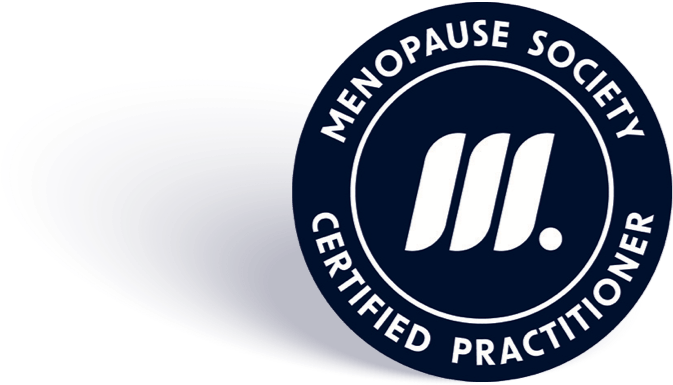Menopause Topics:
Heart Health
Leading cause of death for both men and women worldwide.

Cardiovascular Disease
Cardiovascular disease (CVD) is a term that includes many diseases of the heart and circulatory system. For both men and women, CVD is the leading cause of death worldwide. Although rates have decreased because of advances in diagnosis, prevention, and treatment, still one in three US women will die of heart disease, and more women will die of CVD than men.
The risk for CVD in women increases with age such as it does in men, but the increase starts a little later in women. Most CVD in women occurs during the years after menopause. Cholesterol levels have been found to increase in the early years after menopause. Of note, premature menopause is an established risk factor for CVD.
Risk Factors
A number of risk factors are associated with CVD. Some risk factors for heart disease, such as family history or ethnicity, cannot be changed. Others can be modified.
- Smoking: Tobacco use is the single most important preventable risk factor for CVD in women. Women who smoke are two to six times more likely to have a heart attack than are nonsmokers. When a woman stops smoking, no matter how long or how much she has smoked, her risk of heart disease, along with other health risks, drops quickly.
- Blood pressure: A normal blood pressure (BP) reading is when the systolic pressure (upper number) is lower than 120 mm Hg and the diastolic pressure (lower number) is lower than 80 mm Hg. When these levels climb to 130 mm Hg or higher for systolic pressure or 80 mm Hg or higher for diastolic pressure, this is considered high blood pressure (hypertension). Treatment is recommended for women whose BP regularly exceeds these limits.
- Cholesterol: High levels of cholesterol, especially high levels of low-density lipoprotein cholesterol (LDL-C), in the blood can cause a buildup of plaque on the inner walls of arteries. Plaque slows blood flow or blocks it entirely. If a blood vessel in the heart becomes blocked, a heart attack can occur. If this blockage happens in a blood vessel in the brain, a stroke can occur. Elevated cholesterol levels are a major risk factor for CVD.
- Diabetes: People with diabetes are significantly more likely to develop heart disease than people without diabetes. Preventing diabetes by losing weight and watching your diet is important because these are factors that you can control.
- Exercise: Regular physical activity, particularly aerobic exercise, promotes cardiovascular health. Midlife women who exercise regularly have lower weight, BP, and blood glucose levels, as well as healthier cholesterol levels. It’s recommended that women accumulate at least 150 minutes per week of moderate exercise (such as brisk walking) or 75 minutes per week of vigorous exercise.
- Weight: Maintaining a healthy body weight is important for optimal cardiovascular health. Women who are overweight can reduce health risks greatly by losing just 10% of their weight. A combined approach of diet and exercise is best.
- Nutrition: Choose a diet that includes a variety of fruits and vegetables, whole grains and high fiber, fish, proteins low in saturated fat and cholesterol, limited sodium, and limited alcohol consumption.
Frequently Asked Questions
Will aspirin prevent me from having a heart attack?
Aspirin therapy is commonly recommended for women with existing CVD to reduce risk of a second stroke or heart attack, but the benefits have not been clearly shown to outweigh the risks with the use of a daily low-dose (81 mg) “baby” aspirin as a CVD prevention strategy. Don’t begin aspirin therapy without a discussion with your healthcare professional to assess the risks.
Will having premature menopause increase my risks for developing cardiovascular disease?
It has been shown that premature menopause may increase the risk of heart disease later in life. To prevent developing CVD, it’s important to follow a heart-healthy lifestyle. Routine blood cholesterol testing and other tests, such as for diabetes, can help monitor specific risk factors, and medications may be recommended to optimize control.
Videos & Podcasts
The Menopause Society is proud of its comprehensive video series for women and healthcare professionals on important midlife health topics.
View the entire video & podcast series
Menopause and Heart Disease
Dr. Erin Michos
What You Need to Know About the #1 Cause of Death in Women
Dr Samar El Khoudary
Additional resources on this topic
Other menopause topics

Need help finding a certified menopause practitioner?
Need help finding a certified menopause practitioner? The Menopause Society’s website offers a searchable listing of healthcare professionals, including those who have earned the prestigious Menopause Society Certified Practitioner (MSCP) credential. Start your search for a certified menopause practitioner today.
Start your search for a certified menopause practitioner today.







